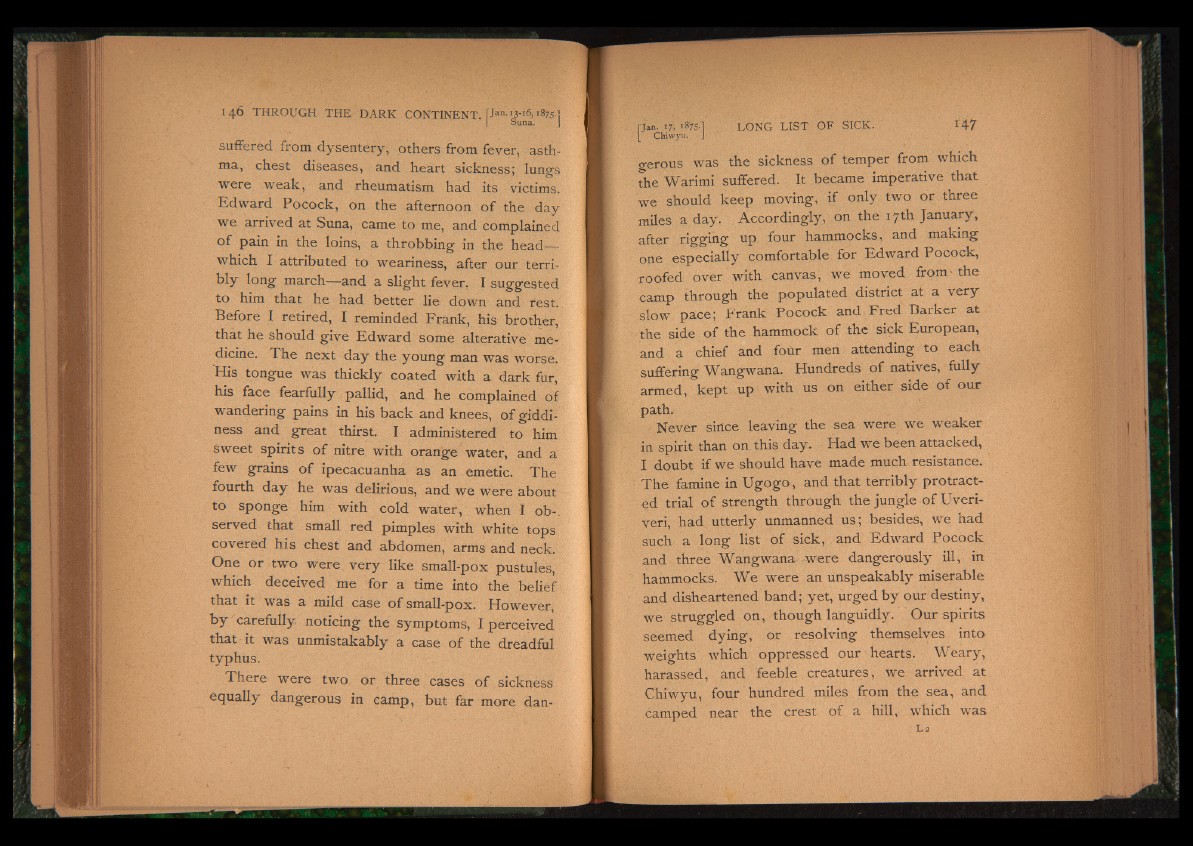
suffered from dysentery, others from fever, asthma,
chest diseases, and heart sickness; lungs
were w eak , and rheumatism had its victims.
Edward Pocock, on the afternoon o f the day
we arrived at Suna, came to me, and complained
o f pain in the loins, a throbbing in the head—
which I attributed to weariness, after our terrib
ly long march— and a slight fever, I suggested
to him that he had better lie down and rest.
Before I retired, I reminded Frank, his brother,
that he should give Edward some alterative medicine.
T he next d ay the young man was worse.
His tongue was th ickly coated with a dark fur,
his face fearfully pallid, and he complained of
wandering pains in his back and knees, o f giddiness
and great thirst. I administered to him
sweet spirits o f nitre with orange water, and a
few grains o f ipecacuanha as an emetic. The
fourth d ay he was delirious, and we were about
to sponge him with cold water, when I ob-.
served that small red pimples with white tops
covered his chest and abdomen, arms and neck.
One or two were r v e ry like small-pox pustules,
which deceived me for a time into the belief
that it was a mild case o f small-pox. However,
b y carefully noticing the symptoms, I perceived
that it was unmistakably a case o f the dreadful
typhus.
There were two or three cases o f sickness
equally dangerous in camp, but far more danrjan.
17, 1875-1 LONG LIST OF SICK. 147
[ Chiwyu. J '
crerous was the sickness o f temper from which
the Warimi suffered. It became imperative that
we should keep moving, if only two or three
miles a day. Accordingly, on the 17th January,
after figging up four hammocks, and making
one especially comfortable for Edward Pocock,
roofed o v e r with canvas, we moved from 'th e
camp through the populated district at a v e r y
slow pace; Frank Pocock and Fred Barker at
the side o f the hammock o f the sick European,
and a chief and four men attending to each
suffering Wangwana. Hundreds o f natives, fully
armed, kept up with us on either side o f our
path.
Never since leaving the sea were we weaker
in spirit than on this day. Had w e been attacked,
I doubt if we should have made much resistance.
T h e famine in U g o g o , and that terribly protracted
trial o f strength through the jungle o f Uveri-
veri, had utterly unmanned us; besides, we had
such a long list o f sick, and Edward Po co ck
and three Wangwana were dangerously ill, in
hammocks. W e were an unspeakably miserable
and disheartened band; yet, urged b y our destiny,
we struggled on, though languidly. Our spirits
seemed dying, or resolving themselves into
weights which oppressed our hearts. W e a ry ,
harassed, and feeble creatures, we arrived at
Chiwyu, four hundred miles from the sea, and
camped near the crest o f a hill, which was